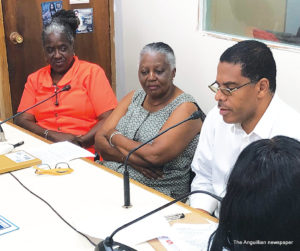
In light of Patient Safety Awareness Week, being recognized from March 10th to 16th, on Wednesday March 20th the National Chronic Disease Unit hosted its second ‘Talking Chronic Diseases Radio Show’ for the year 2019.
The topic for the show was ‘Patient Safety Awareness as it relates to Chronic Diseases.’ The guests on the show were Dr. Clyde Bryan, Mrs. Civilla Kentish and Nurse Diana Carty. The host of the show was Ms. Fedalia Richardson, Non-Communicable Diseases Programme Officer.
On the show, three key areas were discussed: Infection Control, Medication Errors for Chronic Disease Patients and Geriatric Care.
Patient Safety Awareness Week is an annual recognition event intended to encourage everyone to learn more about health care safety. During this time health professionals seek to advance important discussions locally and globally, and inspire action to improve the safety of the health care system – for patients and the workforce. Everyone interacts with the health care system at some point in life and everyone has a role to play in advancing safe health care. Patient Safety Awareness Week serves as a dedicated time and platform for growing awareness about patient safety.
According to the World Health Organization, Patient Safety is the absence of preventable harm to a patient during the process of health care and reduction of risk of unnecessary harm associated with health care to an acceptable minimum.
Infection Control
Nurse Diana Carty reminded persons that it is important to wash their hands. She also reminded persons that it is ok to ask your health care provider if they have washed their hands before being examined or treated. She also noted that soap and water should be used for hand washing and that hand sanitizer can be used if hands are not visibly soiled.
Infection Control for Diabetics
Nurse Carty reminded diabetic patients that they should always clean the skin before injecting one’s self and that they must use insulin syringes singly; this means that a syringe should only be used ONE time. Used syringes should be disposed in a bottle container. There are special containers which can be purchased from the pharmacy at the hospital. Nurse Carty encouraged persons needing assistance with having adequate syringes and disposal containers to visit the Princess Alexandra Hospital to ask for help.
Medication Errors
Dr. Bryan noted that medication errors are a growing area of international attention. He noted that it is very important for doctors to convey to their patients what medications are for and how they should be taken. He also believes that it is important to write instructions down so that even if patients do not remember that they have the notes to remind them. He also noted that pharmacists should take care to reiterate the same instructions when patients are receiving medications.

All patient medications may have adverse effects. Adverse effects need to be communicated as well. He advised that patients should always be asked how they are taking their medications during follow up visits to see what they have understood. This is often how medication errors can be picked up.
Dr. Bryan urged patients NOT to take medications from one vial and put them in another in order to prevent medication errors.
The host reminded listeners that it is important that patients know their medications and what each medication is for. She urged them to take charge of their own health by asking questions when they visit their healthcare providers to know what their medications are for and how they should be taken.
Nurse Diana Carty encouraged persons to contact their health care providers if they notice that they have encountered a medication error of any kind.
Geriatric Care
Mrs. Civilla Kentish gave very useful tips for taking care of geriatric chronic disease patients. For diabetic patients who are elderly, she reminded persons to keep the home well-lit as sometimes these patients may have difficulties with vision, especially at night. Railings should be used in the home to aid with walking, and spills should be cleaned up as soon as possible to avoid slips and falls.
Patients at home and in the hospital are urged to know about their care. Never be afraid to ask questions and do their part to remain safe at all times.
– Contributed







